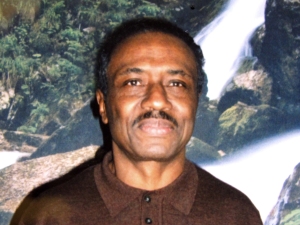 Herman Bell has been to the New York state parole board six times and has been denied each time. His next parole board appearance will be in early February 2016. Each time, the board – always made of up former law enforcement personnel and former prosecutors — reviews his very impressive record, the Bachelor’s and Master’s college degrees he has attained since being locked up, his job offers, his numerous letters of support from family, friends, and community members from many walks of life. They have before them evidence of all the ways Herman has helped so many people throughout the course of his confinement and is still leading a positive and progressive life despite being locked up now over four decades. And then they deny him parole based on their opinion that to release him would “deprecate” the serious nature of his charge of conviction. Is this rationale not, in effect, an illegal re-sentencing to life-without-the-possibility-of parole? When one goes to trial, there is a prosecutor, one’s defense attorney, a judge, and a jury. When one goes to the parole board, there is only the prosecution.
Herman Bell has been to the New York state parole board six times and has been denied each time. His next parole board appearance will be in early February 2016. Each time, the board – always made of up former law enforcement personnel and former prosecutors — reviews his very impressive record, the Bachelor’s and Master’s college degrees he has attained since being locked up, his job offers, his numerous letters of support from family, friends, and community members from many walks of life. They have before them evidence of all the ways Herman has helped so many people throughout the course of his confinement and is still leading a positive and progressive life despite being locked up now over four decades. And then they deny him parole based on their opinion that to release him would “deprecate” the serious nature of his charge of conviction. Is this rationale not, in effect, an illegal re-sentencing to life-without-the-possibility-of parole? When one goes to trial, there is a prosecutor, one’s defense attorney, a judge, and a jury. When one goes to the parole board, there is only the prosecution.
Here’s how you can help:
 Herman has taken responsibility for his part in the Black Liberation Movement’s resistance to racist authority. He has paid a great price – 42 years of imprisonment, thus far. He is going to the New York state parole board for the seventh time in February 2016 and deserves to be paroled, to come home to his family and community.
Herman has taken responsibility for his part in the Black Liberation Movement’s resistance to racist authority. He has paid a great price – 42 years of imprisonment, thus far. He is going to the New York state parole board for the seventh time in February 2016 and deserves to be paroled, to come home to his family and community.
1 – Please write your letter to the parole board on professional letterhead. Your letter should be addressed to: “To Whom It May Concern” or “Dear Parole Commissioner”. The subject line should be “Herman Bell, 79C-0262.”
2 – Please indicate how you know Herman, or if you don’t know him personally, how you know of him.
3 – Please sign your letter and mail to Herman’s attorney:
Robert J. Boyle, 277 Broadway, Suite 1501, New York, NY 10007.
Herman very much appreciates your efforts and your support.
Message from Herman Bell Fall 2015
I’ve been told it’s good that you should hear my voice, hear something direct from me. So where to begin, what to say?
A pal of mine, I met him in here, went home after 32 years of imprisonment. He left me a note as he departed. He wrote:
“It appears my number has come up. You witnessed firsthand how corrupt and confusing the Penal/Parole System is . . . I will be forwarding you a redacted copy of my minutes so you’ll know exactly how trifling the system is. Listen to me preaching to the choir . . .
“Anyway, you have seen a hundred decent guys get out. It breaks my heart that they think of you as a threat to society because I know you personally and it has been a pleasure to be in your presence, as you always maintain a positive outlook, even during the most painful times. The Herman Bell that I know is a warm, caring human being that understands how life works, understands that he cannot change what took place almost half a century ago. Yet, you smile, hold your head high, and gave me invaluable advice, genuine concern, and let a few knuckleheads know I was a friend of yours, which I hold dear to my heart. Your friendship is valued beyond words. In a real world setting, I believe you would be a fine addition to society. If the Board could see what I see.
“I value your friendship and am always an ear for you and a shoulder to lean on. Be safe, stay strong, and know you have a real friend out there.”
My thought is that your curiosity might want to hear what he says of me, as I want you to connect with me, want you to feel my hand in yours, want you to see and experience my journey.
I’ve been locked in a prison cell for 42 years; have spent more time in prison than I have on the streets. I need your support to get
me out so I can go home. I’m as ordinary as your neighbor next door. No different than you are. I have a wife, children, and two lovely school-age granddaughters. I value hard work, fair treatment, social justice, transparency and accountability. You can say I’m a “people’s” person. I believe strongly that people should help people, that “to each according to his or her needs and from each according to his or her ability.”
You see, I am not a criminal in the strict sense of the word. I never posed a danger to civil society. I never sought personal gain from my political actions; never robbed, never threatened, coerced, nor intimidated anyone in civil society. I never sold drugs. But I did, as did others, militantly resist the unrelenting structural violence of white racist domination and control that has afflicted the Black community since Black people were brought here as slaves.
Accordingly, in early February 2016, I will appear once again before the New York State Parole Board, my 7th. I’m eligible for parole release every 2 years. I’ve done the time on a 25-to-life sentence. I have satisfied all structural requirements over these long years and have had no serious disciplinary issues. Yet each time I appear before the Board, I’m denied parole “due to the nature of my offense;” the assassination of two NYC policemen.
The nature of my sentence of conviction arose from the immense social turmoil of the ‘60s and ‘70s and the f.b.i.’s infamous counter-insurgent program known as COINTELPRO that sought through diverse and insidious means to destroy the Black Panther Party founded in Oakland, CA in 1965, that I was a member of. This government program sought to deny Black political and economic self-empowerment. Destruction of the B.P.P., in the words of then f.b.i. director Hoover “by any means necessary,” was paramount to this design. Nationally, Cointelpro enlisted the aid of local and state police agencies in this campaign. It was a push to maintain the levers of racist political power in this country that has dominated and controlled the lives of Black people through terror, bloodshed, lashing and lynching since its founding. (The rage and sorrow of Black people had sat in the darkness far too long.) And we pushed back in defense of our community: against that tradition of domination and control that has persistently fed off Black people in this country longer than they have been freed. It was an unapologetic direct attack on and resistance to the racist power structure in this country that has so historically maltreated and shamelessly exploited Black people as though it were a national birthright. It gratified some and astonished others. And as unfortunate and regrettable as it often is in civil conflict, violence and bloodshed on both sides are bound to occur. You may find my sentence of conviction inexcusable. You may likewise find the government’s actions during those times inexcusable too. We Panthers were imprisoned. F.b.i., state, and local police agents and their provocateurs went unindicted for their unprovoked attacks on the Black community.
“Slavery by Another Name,” a book by American author Douglas Blackmon, says of america: “We formed in molds twisted by the gifts we received at the expense of others. It is not our ‘fault.’ But it is undeniably our inheritance.” Current f.b.i. director Comey admits that “the history of law enforcement in this country was not only part of the architecture of oppression but also a brutal tool of that system.”
This history, these events, are what I’m up against whenever I go before the Parole Board. The NY police union (PBA) have a close connection with the NY tabloids and each time before I go to the Board, newspaper articles opposing my release is a front page story and online the PBA circulates a petition opposing my release, creating the impression of groundswell opposition to my release, when it’s just the PBA.
You can write the New York State Parole Board and tell them how you feel. By writing the Parole Board supporting my release (because I’ve done the time, have satisfied all legal requirements, and deserve to be released) does in no way mean that you advocate, support, or intend to mimic what I did yourself. It simply mean you think I’ve done enough time and should be allowed to go home.
Thank you — Herman